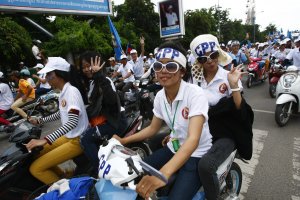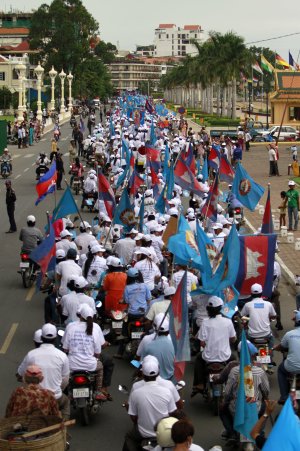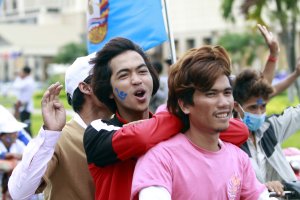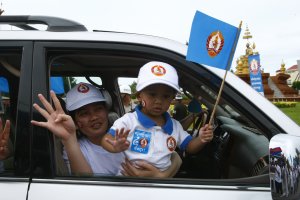By GRANT PECK
BANGKOK (AP) — Voters in Cambodia go to the polls Sunday to take part
in what has become a familiar ritual — the re-election of Prime
Minister Hun Sen, who has been in the job for 28 years and says he hopes
to rule for at least another decade.
With money, power and guns
behind it, Hun Sen's Cambodian People's Party is expected to win another
comfortable majority in the National Assembly, where it holds 90 of the
123 seats. But unity in the opposition ranks, along with an explosion
of young Cambodians coming of voting age, hold out the possibility of
the doughty Cambodia National Rescue Party at least slowing Hun Sen's
juggernaut.
In theory, the country's 9.6 million registered voters
could turn Hun Sen and his party out of office. In practice, the
party's crony-funded wealth, control of the levers of government and the
bureaucracy, the backing of the military and police and party
domination of the media means that it can manipulate the election
process at any stage.
"This is not an election where the outcome
is in doubt or the CPP would give up power if it lost the vote," said
Brad Adams, the Asia director of Human Rights Watch. "To talk about it
as a contest misrepresents the reality on the ground, which is that this
is a charade."
Still, its dominance at the polls over the past quarter century hasn't been achieved through underhandedness alone.
The
party is popular in the countryside, where villagers benefit from
infrastructure built by the government — for which the CPP takes credit —
and election-season distributions of rice and other staples. Plus, many
Cambodians see Hun Sen as having finally brought peace after decades of
civil war and the disastrous Khmer Rouge regime that killed 1.7 million
people in the late 1970s.
"The CPP has always been stronger in
the countryside," Adams said. "People appreciate the modest economic
benefits they receive and given the low standard of living, may see
small things as big improvements."
As much as he is a strongman,
Hun Sen is also a skilled politician who knows the importance of
managing his image — and that of the opposition.
He demonstrated
his savvy last week, when he arranged for a royal pardon to clear the
way for his chief rival, opposition leader Sam Rainsy, to return from
self-imposed exile in order to campaign for the Cambodia National Rescue
Party.
The gesture looked magnanimous, especially in light of the
rapturous welcome Rainsy received from as many as 100,000 opposition
supporters in the capital, Phnom Penh.
Hun
Sen said he acted in the interests of national unity and
reconciliation, and to promote democracy. More credibly, he was
responding to the international pressure for fair polls that rears its
head only when campaigning begins, allowing Hun Sen to calibrate his
generosity so the opposition won't have enough time to take advantage of
the opening.
It's a tactic Hun Sen has used before, bearing down —
in the past quite brutally — on his opponents, only to ease up just
ahead of elections. Typically, he tightens the screws again after the
polls.
Hun Sen isn't without his vulnerabilities, however, and
they are more in focus this time than in the last election in 2008, when
a border dispute with Thailand cloaked him in patriotism. Corruption
and land-grabbing by the rich and well-connected are tinderbox issues
that pit Hun Sen's populist political instincts against his loyalty to
cronies.
His continued assault on political enemies also has had the unintended side effect of uniting a formerly fractured opposition.
"Hun
Sen has in many respects appeared stronger than ever," said Astrid
Norén-Nilsson, a Cambodia scholar at the University of Cambridge. "Yet
the systematic weakening of the opposition has resulted in an
increasingly polarized political scene, prompting the opposition to
overcome its internal divisions which had previously been its curse."
The newest challenge Hun Sen faces, and one he is powerless to control, is demographics.
The
under-30 crowd now represents more than half the electorate, and that
will only grow in future elections as just over 50 percent of the
population of almost 15 million people is under the age of 25.
While all parties court the young, many believe these shifting demographics favor the opposition.
For
the half of the country that didn't live through the Khmer Rouge and
its brutality, the stability Hun Sen offers is not as important as
issues like economic growth, education, less corruption and better
government services.
They are keen to taste the fruits of
globalization, many of them material, and Rainsy paints himself as able
to deliver them because he is a modern, Westernized technocrat, removed
from traditional ways of corruption and cronyism.
While
Hun Sen is sure to prevail at Sunday's vote, he may find that it is the
last time his grip on the ballot box is iron clad, said Ou Virak,
president of the Cambodian Center for Human Rights.
"Given that
most of the current ruling elite came to power some 30 years ago, and
the baby boomer, post-Khmer Rouge generation will soon be in their early
30s, change is definitely in the air," he said.
____
Peck has covered Southeast Asia for more than 20 years, including several previous Cambodian elections.






No comments:
Post a Comment